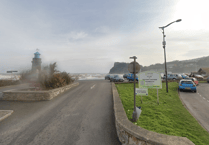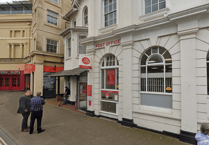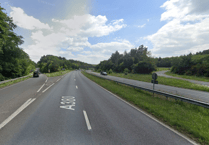A CLOSE encounter with a goat left Teignmouth’s mayor bruised and broken, and she also survived a nightmare rail journey, on a recent African trip.
Cllr Jacqui Orme said she had ‘a slight altercation with a tethered goat’ in Kenya, and fell heavily.
‘I skidded to an undignified halt at the feet of a small crowd of local children, dislocating my elbow in the process.
‘With no ambulances in the rural area, I travelled by matatu (a private minibus) the following day to a hospital where they prescribed a rather brutal twice daily routine of African-style manipulation to put the elbow back in place.
‘Later it was discovered that my arm was also broken. In a place where people can simply be left to die at the roadside, it could have been a lot worse,’ was her philosophical verdict on returning to Teignmouth and resuming her mayoral duties.
She has close links with Kenya, and is trying to improve the lives of local people, by setting up a new charity to help build a community centre, in an impoverished rural area, which could become self-sustaining in one to two years.
‘I spent most of my time living with local families and experiencing the problems and issues which they face on a daily basis. Access to free education and basic healthcare are the basic prerequisites which would make a fundamental difference to the lives of people in this region.
‘Inhabited largely by subsistence farmers, the effects of climate change have serious and in some cases insurmountable repercussions. The main impact on quality of life is loss of crops due to unexpected climatic conditions, from drought or floods through to hailstorms, the delicate balance is easily disrupted.
‘Lack of revenue from the sale of maize and other crops meansw that school fees are unaffordable and the future prospects of bright, intelligent and hardworking children are compromised.
‘The main purpose of the trip was a fact-finding journey to establish the best place to construct a community centre to serve the local community, provide adult education and enable them to produce and sell goods to generate a revenue and become self-sustaining.
‘Finding the right location for the building is paramount as the main objective is to enable the local people to ultimately become financially independent. Months of scrutinising a map, and with assistance from a team of Kenyans with local knowledge, we set about a small programme to construct two traditional African homes, to relocate two groups of people to an area of fertile land on the outskirts of a small town on the border of Kenya and Uganda.
‘From here we are hoping to initially set up a club where volunteers can meet regularly to undertake various projects to benefit the local community. Before their homes were even completed, they were galvanised into action by the plight of hundreds of local children suffering from jiggers (parasitic fleas), and we began a programme of treatment which they are expanding in January by liaising with nearby primary schools in order to reach more sufferers.
‘They are also hoping to continue to work with local people to educate them in more effective methods of farming. The area has a lot of resources but lack of funds means that exploiting them is very difficult, but with more effective crop planting it could generate much higher yields.’
Cllr Orme also met up with Catherine Omanyo, who is headmistress of the Imprezza Academy, which has close links with the Teignmouth-based charity of the same name, and they visited the Bidii Development, which is semi-derelict. It was intended to become a day care centre, but government funds to complete the structure have dried up.
She also undertook a hazardous rail trip across the country from the Ugandan border to a small island near to Tanzania in order to travel on the Rift Valley railway.
‘I survived the arduous return journey from Mombasa via what is affectionately known as the Lunatic Line. Its name didn’t deter me, although in retrospect it probably should have. Portrayed as an “experience” the return journey was not one I would have chosen had the advance ticket purchase not meant I was fully committed.
‘The connecting plates between the sleeper and dining carriage had further deteriorated on the way back, and one swung forlornly by a single rivet, the track clearly visible below, and the entire carriage creaked and lurched, worryingly in the opposite direction to the adjacent ones.
‘My vision of a romantic journey in the style of the Orient Express was well and truly extinguished when a large spoonful of lukewarm rice was slopped vaguely in my direction as the poor attendant struggled to maintain equilibrium.
‘The whole tortuous trip took well over 20 hours, at a reduced speed to minimise the risk of derailment apparently! During its construction more than a hundred years ago, 28 construction workers were mauled by lions, and 19 hours into the outbound journey it would have been a welcome reprieve!
‘I flicked through a copy of the Nairobian to distract myself from the obvious health and safety failures and an article about the dangers of the Mombasa Ferry, which I also had the misfortune of travelling twice, gave little solace, despite the owners reassuring the hapless passengers that so far this year it hadn’t sunk, capsized or cost the loss of any lives – quite a triumph they claimed.
‘Reassuringly, I shared the outward journey with a doctor, a nurse and an army doctor, all unanimous in the view that the train should be decommissioned immediately until completion of the new Rift Valley line, which we could see under construction and running adjacent to our more perilous option.
‘Funded by the Chinese, and in association with the Kenyan government it is due for completion next year, and once it continues through to Uganda, will bring about huge logistical and economic benefits, expedite the movement of goods back and forth across the border and considerably improve and reduce journey times for passengers.
‘I met several more enterprising people, including a man who suffered childhood polio and earned a living from making sand sculptures instead of the career in law that he originally aspired to. As the best performing student in his region he should have achieved his goals, but for the lack of funds to enable him to attend university.
‘The country is full of similar stories and deserving cases of people who just need a chance. In Western Province the difficulties are extreme and, without the benefit of tourism, the land is the only option for generating survival.
‘One of the objectives of the group when they set up their club is to generate an income to enable them to continue the community outreach programme.
‘The mid-morning sun was beating down as we made the second attempt to look at the four acres of rented land that would enable them to start the process. The first attempt was thwarted when heavy rains had waterlogged the ground and swelled the river, making me reluctant to risk further injury to my arm by attempting to cross it. By the time we left, the blazing sun had dried most of the mud; it had been the hottest year on record in Kenya and I couldn’t miss the irony of a place where none of the mud homes had access to fresh drinking water, yet the effects of El Niño had ensured storms and torrential rain on a daily basis.
‘One of our group, who currently grows tobacco and is experienced in a variety of farming methods, declared that he had never seen such fertile land and with the support of our little group of local volunteers there is the potential to train people in more effective and lucrative farming methods.
‘Harnessing the opportunities presented by extreme weather could also prove to be beneficial. On certain days, during flooding, huge fish swim down the roads and tracks and can be speared and sold at the market. With the construction of a simple structure fish farming would also be possible.’




Comments
This article has no comments yet. Be the first to leave a comment.